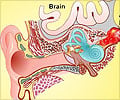Researchers have found that the nerve fibres that link perception and motor regions of the brain are disconnected in tone-deaf people.
Researchers have found that the nerve fibres that link perception and motor regions of the brain are disconnected in tone-deaf people.
According to experts' estimates, at least 10 percent of the population may be tone deaf - unable to sing in tune.The new finding has pinpointed a particular brain circuit that is believed to be absent in these individuals.
"The anomaly suggests that tone-deafness may be a previously undetected neurological syndrome similar to other speech and language disorders, in which connections between perceptual and motor regions are impaired," said Dr. Psyche Loui, of Beth Israel Deaconess Medical Center and Harvard Medical School, one of the study's authors.
For the study, the researchers used an MRI-based technique called diffusion tensor imaging to examine connections between the right temporal and frontal lobes.
It is known that this region, a neural "highway" called the arcuate fasciculus, is involved in linking music and language perception with vocal production.
They took brain images of 20 people, half of whom had been identified as tone-deaf through listening tests.
Advertisement
Particularly, the superior branch of the arcuate fasciculus in the right hemisphere could not be detected in the tone-deaf individuals.
Advertisement
"The findings are clear. They show that the arcuate fasciculus, a structure long-known to join perceptual and motor areas, has reduced connectivity in individuals with tone deafness. Beyond improving our understanding of the anatomical underpinnings of tone-deafness, this study provides new insight into a person's ability to detect pitch," said Dr. Nina Kraus, at Northwestern University.
The findings add to previous work by the same researchers demonstrating that tone-deaf people could not consciously hear their own singing, and work by other researchers indicating abnormalities in brain regions that affect sound perception and production.
The study has been published in the latest issue of The Journal of Neuroscience.
Source-ANI
SRM






